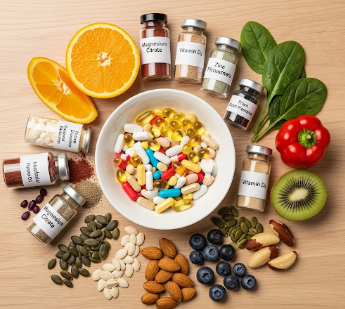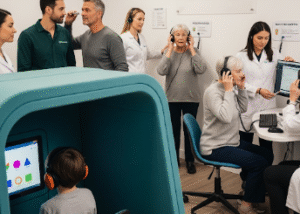What it is
Vitamins and minerals are essential nutrients required by the body for normal growth, development, and physiological function. They are obtained from dietary sources, fortified foods, or supplements.
➡ Key facts:
- ✔ Vitamins are organic compounds (e.g., A, C, D, E, K, B-complex)
- ✔ Minerals are inorganic elements (e.g., calcium, magnesium, iron, zinc, potassium)
- ✔ Both are critical for immune function, bone health, metabolism, and overall well-being
- ✔ Widely available in pharmacies, hospitals, nutrition clinics, and health stores in Korea
💡 Adequate intake of vitamins and minerals prevents deficiencies, supports health, and enhances quality of life.
Why it’s done
Vitamins and minerals are used to:
➤ Prevent deficiencies → e.g., vitamin D for bone health, iron for anemia
➤ Support growth and development → Especially in children and adolescents
➤ Enhance immune function → Vitamins C, D, zinc, and selenium
➤ Manage chronic conditions → Osteoporosis, cardiovascular health, or pregnancy nutrition
➤ Complement diet → Ensure sufficient intake when dietary sources are inadequate
⚠ Deficiency in vitamins or minerals can lead to serious health issues, including fatigue, weakened immunity, bone disorders, and cognitive impairment.
Alternatives / Complementary Measures
Other strategies to maintain adequate nutrient intake include:
✔ Balanced diet → Fruits, vegetables, whole grains, dairy, lean protein, and fortified foods
✔ Functional foods → Foods enhanced with specific nutrients
✔ Lifestyle modifications → Regular exercise, sun exposure for vitamin D, avoiding excessive alcohol
✔ Intravenous supplementation → For severe deficiencies or malabsorption disorders
⚠ Supplements do not replace a healthy diet but can help meet nutritional gaps.
Preparation
Before starting vitamin or mineral supplementation in Korea:
🔹 Medical consultation → Blood tests to identify deficiencies or excess
🔹 Medication review → Avoid interactions with prescribed drugs (e.g., calcium with certain antibiotics)
🔹 Dietary assessment → Determine current intake from food sources
🔹 Allergy or sensitivity check → Some supplements may contain allergens
🔹 Dosage guidance → Tailored according to age, gender, and health status
💡 Korean nutritionists and healthcare providers ensure personalized recommendations based on clinical needs and dietary habits.
How it’s done
➡ Step-by-step supplementation process:
- Assessment → Evaluate nutrient needs through blood tests or dietary analysis
- Selection → Choose appropriate vitamins/minerals in tablet, capsule, liquid, or powder form
- Administration → Oral intake with water, sometimes with food to enhance absorption
- Monitoring → Regular blood tests to check levels and adjust dosage
- Adjustment → Modify intake based on lab results, age, or lifestyle changes
💡 Supplementation in Korea is safe, convenient, and tailored, with healthcare guidance for maximum effectiveness.
Effectiveness & Success Rate
✔ Prevents deficiencies and associated health issues
✔ Supports growth, immunity, and metabolic functions
✔ Reduces risk of chronic conditions when combined with lifestyle interventions
✔ Quick improvement in laboratory values and clinical symptoms with proper supplementation
💡 Korean clinics and nutrition centers follow evidence-based protocols for supplement selection and dosing.
Recovery / Expected Outcomes
✔ Rapid symptom improvement → Fatigue, anemia, or bone weakness
✔ Long-term health benefits → Stronger immunity, bone health, and cognitive function
✔ Safe integration → Supplements are typically well-tolerated
✔ Follow-up monitoring → Adjust doses to prevent toxicity or deficiencies
✔ Lifestyle synergy → Combined with diet and exercise for optimal results
💡 Patients in Korea often report enhanced energy, immunity, and overall wellness with proper vitamin and mineral supplementation.
Complications / Risks
⚠ While generally safe, excessive intake or improper use may lead to:
➡ Vitamin toxicity (hypervitaminosis) → Fat-soluble vitamins A, D, E, K
➡ Mineral overload → Excess iron or calcium may cause organ damage
➡ Gastrointestinal upset → Nausea, constipation, diarrhea
➡ Interactions with medications → Blood thinners, antibiotics, or heart medications
➡ Allergic reactions → Rare, usually to additives or excipients in supplements
💡 Korean healthcare providers ensure safe dosing, monitoring, and patient education to minimize risks.
Treatment Options in Korea (Supplementation & Nutritional Management)
🔹 Oral supplements → Tablets, capsules, liquids, gummies
🔹 Intravenous (IV) supplementation → For severe deficiencies or malabsorption
🔹 Customized nutrition plans → Tailored diet plus supplementation
🔹 Regular monitoring → Blood tests for nutrient levels
🔹 Preventive programs → Routine check-ups for at-risk populations (elderly, pregnant women, chronic illness)
💡 Korean clinics integrate medical supervision, dietary guidance, and follow-up monitoring for safe and effective supplementation.
Top Hospitals & Clinics in Korea for Vitamins and Minerals
🏥 Seoul National University Hospital (SNUH) – Comprehensive nutritional assessment and supplementation
🏥 Asan Medical Center (Seoul) – Expert nutrition counseling and laboratory testing
🏥 Samsung Medical Center (Seoul) – IV vitamin therapy and chronic disease management
🏥 Yonsei Severance Hospital – Personalized dietary and supplementation programs
🏥 Private nutrition clinics nationwide – Accessible consultations, supplements, and monitoring
Conclusion
Vitamins and minerals in Korea are essential for optimal health, disease prevention, and wellness.
✔ Support growth, immunity, metabolism, and bone health
✔ Prevent deficiencies and related health complications
✔ Safe, effective, and tailored to individual needs
✔ Korean hospitals and nutrition clinics provide expert guidance, monitoring, and integrated dietary management
By combining clinical assessment, personalized supplementation, and lifestyle guidance, Korea ensures patients maintain optimal nutrient levels, prevent deficiencies, and enhance overall health.













